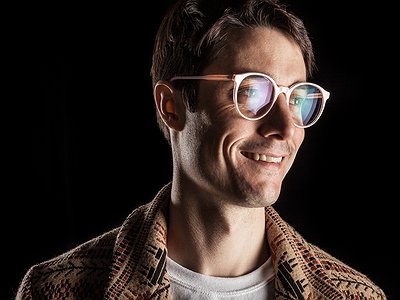Could you take us through a day in your life, from a possible morning routine through to your work? Do you have a fixed schedule? How do life and creativity feed back into each other - do you separate them or instead try to make them blend seamlessly?
Routine is essential to me. I usually start the day quite early because I like to work for 10 hours a day and I don't work so energetically after 8pm. The evenings are important for reading and socialising so it works that way around for me.
Let's say you have a gig coming up tonight. What does your approach look like from selecting the material and preparing for, opening and then building a set?
I take some records and my USBs and just take it from there. There really is no fixed approach, it really depends on my mood and the setting. Building a set involves creating a sense of propulsion and mood, and those are usually the initial considerations in the opening stages.
Can you describe your state of mind during a DJ set? What is going through your head, what are you concerned with, what is your attention focused on? How do you attain your best mind states in this respect - what is a distraction, what is inspiration?
Everything else in my head usually melts away. One of the great things about this job is it allows you to be perfectly present, which to me is one of the foundations of true happiness. Its important to be in an open state, looking around, absorbing details and not just in some tunnel vision worrying about the next track. Hopefully nothing too terrible has occurred recently in life and that mental space will be afforded you.
What are some of the considerations that go into deciding which track to play next? What makes two tracks a good fit? How far do you tend to plan ahead during a set?
Sometimes you want something that is really jarring and disorientating, other times you want something that sounds almost identical with some specific small difference. Usually it's somewhere in the middle of that scale. I'm usually 3 or 4 tracks ahead, but those are always morphing around.
What are important aspects of performance for you? How much do you make use of the possibilities for fusing DJing, composition and production, for example? What role do visuals play in your sets? How would you describe the balance between music and presentation?
None of this really concerns me to be honest.
In an interview with Scott Wilson for Juno, you've mentioned how creative a DJ like Marcel Dettmann could be in his use of frequencies as part of his performance. How important is the sound aspect of DJing in general, would you say, and how do you personally approach and make use of it?
He used to be an incredibly adventurous DJ when using the mixer. I haven't seen him play a set like that in maybe 10 years though. I use everything I can on a mixer - volume, crossfader, EQ, input level, input selector where possible and so on; those are my brushes and I guess the records are my colours.
How would you describe the relationship between your choices and goals as a DJ and the expectations, desires and feedback of the audience? How does this relationship manifest itself during a performance and how do you concretely tap into it?
Hopefully these are in sync! I like a crowd that is open to surprise and doesn't really care about their own expectations. Then you can really go a long way together. People that go to a club to hear a highly specific thing are sad to be honest.
Other than closing time, what marks the end of a DJ performance for you? What are the most satisfying conclusions to a set? What role does the time span alloted to a gig - which can range from 1-2 hours to half a day or more - play in this regard?
I love the way Jeff Mills will put on a track that nobody would consider a 'closing track' and just fade it out. It places everything he does into some kind of endless continuum. I also appreciate a set that ends on a high, as well as one that takes it into a dreamy place and many other techniques. It totally depends!
Art can be a purpose in its own right, but it can also directly feed back into everyday life, take on a social and political role and lead to more engagement. Where do you see your own approach in this regard?
Everything in the world is inherently political and inherently social. If you choose to write poetry alone in a locked room it is a political and social act by choosing to reject a public space and create an isolated experience for only yourself that contributes to a more atomised society. Everything that you choose not to engage with is a political choice not to engage. You only need a very rudimentary grasp of Sartre to understand that. Politics is not an abstract thing that can be separated from human existence, it is just an aspect of all human existence. I try to engage actively with the parts of life that upset me and excite me the most, and my own beliefs for the most part fit a fairly traditional social democratic model that you would find in the writings of Tony Judt for example.



